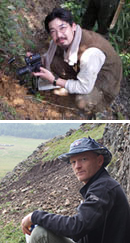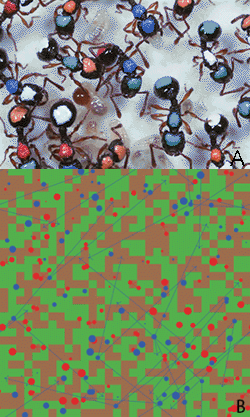|
|
 Systematic Zoology Laboratory
Systematic Zoology Laboratory
|
See below for research topics conducted by each faculty member.
|
|
Asc Prof |
Katsuyuki Eguchi |
e-mail |
|
|
Asc Prof |
Adam L. Cronin |
e-mail |
|
|
Ast Prof |
Takahiro Yoshida |
e-mail |
|
|
|
Systematics and Biogeography of Terrestrial Invertebrates
Katsuyuki Eguchi
(in collaboration with Ast Prof. Francesco Ballarin)
|
|
We are conducting systematic and phylogeographical studies on various groups of terrestrial arthropods, mainly in East Asia and Southeast Asia. In addition, we are studying the distribution, habitat and life history of alien ants (Formicidae) on islands such as the Ogasawara Islands and the Izu Islands, and are contributing to control measures. We welcome Asian students and young researchers who are interested in taxonomy and phylogeography as graduate students and postdocs.
[For details, please see the following websites]
https://www.biol.se.tmu.ac.jp/faculty.asp?Eguchi
https://www.researchgate.net/profile/Katsuyuki_Eguchi
https://www.researchgate.net/profile/Francesco-Ballarin-2
[Press release]
https://www.tmu.ac.jp/news/topics/34709.html
https://www.tmu.ac.jp/news/topics/30877.html
https://www.hosei.ac.jp/NEWS/newsrelease/190416/?auth=9abbb458a78210eb174f4bdd385bcf54
[EurekAlert!]
https://www.eurekalert.org/news-releases/736722
These research activities are conducted in collaboration with Dr. Francesco Ballarin (Special Appointed Assistant Professor). For details of his research see:
https://www.researchgate.net/profile/Francesco-Ballarin-2
We are conducting joint research projects with researchers belonging to various institutions in East and Southeast Asia. We have also accepted many international students. We welcome students, graduate students, and visiting researchers who want to actively enjoy such international circumstances.
[Hosting JSPS Postdoctoral Fellowships for Research in Japan]
2022-11 >>> 2024-11: Taiwan
2018-11 >>> 2020-11: Italy
[Hosting foreign students funded by TM (Tokyo) or MEXT (JAPAN)]
2022-10 >>> 2024-9: MC, Laos, TM
2022-10 >>> 2024-9: MC, Nepal, TM
2022-10 >>> 2024-9: MC, Sri Lanka, TM
2022-10 >>> 2025-9: DC, Laos, TM
2021-10 >>> 2023-9: MC, Indonesia, TM
2019-10 >>> 2021-9: MC, Vietnam, TM
2018-10 >>> 2023-9: MC+DC, Vietnam, TM
2018-10 >>> 2021-9: DC, Taiwan, TM
2017-10 >>> 2021-9: RS+DC, Vietnam, MEXT
2016-10 >>> 2019-9: DC, Vietnam, TM
2014-10 >>> 2017-9: DC, Indonesia, TM
2014-10 >>> 2017-9: DC, Vietnam, TM
|
|
|
Behavioural and Evolutionary Ecology
Adam L. Cronin
|
|

(A) Myrmecina nipponica (B) Netlogo model used to assess the importance of spatial structure in the evolution of alternative life-history strategies, in this case alternative reproductive strategies in ant communities.
Social Organisms as Complex Systems
Highly integrated animal societies such as colonies of social insects can achieve complex tasks far beyond the capabilities of any single individual. These often sophisticated collective tasks are achieved without centralised leadership and with only rudimentary individual intelligence. We study how groups can compile information to exploit the intelligence of the swarm, and how swarm-based systems may be more robust and flexible than individuals in the execution of group tasks such as decision making and collective movement.
Evolutionary-ecology of Life-history Strategies
Social organisms can exploit a range of life-history strategies unavailable to individual organisms, and this may help explain their success in adapting to different environments. Social insects, for example, have a range of adaptive mechanisms to cope with different environments, including alternative reproductive strategies, shifts in trophic ecology and/or variation in social structure. We explore the evolutionary ecology of these adaptive mechanisms using a combination of field-based ecological and behavioural studies, computer simulations, natural isotopic analysis, and molecular phylogenetic and population genetic analyses.
|
|
|
Natural History of Beetles Living in Cryptic Habitats
Takahiro Yoshida
|
|
Numerous insect species live in cryptic habitats (e.g. under/in/on rock, bark, branches and leaves of dead trees, mashrooms, animal droppings, litter, moss, nests of social insects). Most primitive insects, Bristletails, occur under bark of dead trees or rocks, and a lot of subsequent lineages have invaded such cryptic habitats. The invasion to such cryptic habitats may immeasurably promote the superradiaton of Insecta. Otherwise, most of them have small and inconspicuous colored bodies for the adaptation to cryptic habitats, and their biology has been poorly studied. To properly interpret how they have diversed in the cryptic habitats, comprehensive studies including taxonomy, phylogeny, morphology and ecology on various taxon associated with cryptic habitats are required.
Beetles are extraordinary diversified and constitute about 25% of described species of all organisms. Beetles are characterized by the hardened forewings, so-called elytra, which protect their membranous hindwings. Elytra enable them to invade cryptic habitats, which is the one of most likely explanation for the beetle diversification. The study of natural history of the cryptic beetles will provide new important insights for the understanding of biodiversity on Earth. So, I am studying the natural history of such beetles, especially the superfamily Cucujoidea: Taxonomy, Morphology, Phylogeny, Ecology and Evolution. My published papers are listed in the below links:
https://www.researchgate.net/profile/Takahiro-Yoshida-6
https://amamiikitai.wixsite.com/yoshida
Otherwise, I also welcome students, graduate students and Postdocs loving natural history, biodiversity and/or systematics of non cryptic beetles and other arthropods.
|
|
|
 Systematic Zoology Laboratory
Systematic Zoology Laboratory
 Systematic Zoology Laboratory
Systematic Zoology Laboratory